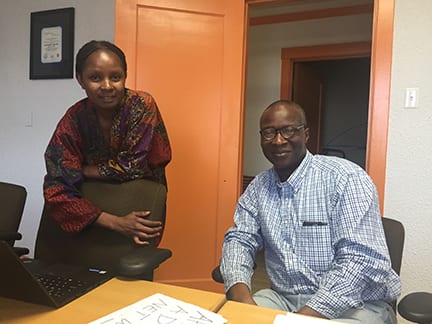By Peter White
NASHVILLE, TN — Last September Nancy Pelosi was shouted down at a news conference in San Francisco for urging a vote on the Dream Act. Immigrant activists wanted a bill to protect Dreamers and their parents. In any case, Trump’s border wall was too high a price to pay.
What seemed possible just a few months ago seems like Camelot now. Four Senate immigration bills failed in Washington last week and the fate of the Dreamers is still up in the air.
”At this moments things are very dire and that’s why I think it’s so important in my call to all American of good will to really speak up because otherwise we will just have more of what’s happening which is mass round ups in the morning, in the early early morning or at nighttime,” said Angelica Salas, Executive Director of the Coalition for Humane Immigrant Rights of Los Angeles (CHIRLA).
Salas described a recent Immigration and Customs Enforcement (ICE) raid on workers in a Los Angeles commercial district when ICE agents “just showed up” and started asking people for their social security cards.
“That’s very very open in terms of enforcement. Is that the kind of country we want to live in? I think all of us need to answer that question and what are we going to do about it,” Salas said.
Advocates say whatever happens in Washington won’t stop indiscriminate detentions and deportations under what amounts to a return to the controversial 287(g) enforcement program that President Obama ended in 2012. Trump has brought it back.
Even though Dreamers got temporary protection under the Deferred Action for Childhood Arrivals (DACA), arrests and deportations increased dramatically under Obama’s Secure Communities program. They have increased even more since Trump took office.
In January 2017, the President ordered the Department of Homeland Security to create more partnerships with sheriffs and police departments in order to use local law enforcement as ICE agents.
According to the Atlantic magazine, immigration arrests increased by 40 percent between January and May of 2017. ICE claimed three quarters of those arrested were convicted criminals but the number of immigrants with no criminal record who were arrested was 10,800 compared to 4,200 in that same period in 2016.
Washington gridlock is leaving in limbo the legal status of an estimated 11 million undocumented immigrants. Meanwhile, arrests and fast-tracking people to deportation continues unabated. While ICE is sweeping thousands into detention, it is also targeting specific individuals.
Ravi Ragbir is an immigrant rights leader with the New Sanctuary Coalition in New York. He is a native of Trinidad and Tobago. Amy Goodman of Democracy Now reported that he was released from three weeks of detention on January 10 and re-arrested by ICE January 11 and rushed into deportation proceedings the next day.
Demonstrations and quick legal action stopped his deportation. U.S. District Judge Katherine B. Forrest ordered Ragbir’s immediate release on January 15 with a stinging rebuke to ICE.
“It ought not to be—and it has never before been—that those who have lived without incident in this country for years are subjected to treatment we associate with regimes we revile as unjust, regimes where those who have long lived in a country may be taken without notice from streets, home, and work. And sent away. We are not that country, and woe be the day when we become that country under a fiction that laws allow it. We have a law higher than any that may be so interpreted — and that is our Constitution,” Forrest wrote.
President Trump’s travel ban on people from countries with large Muslim populations is being enforced. The Supreme Court will decide its fate, perhaps by June 2018, but the high court may uphold the ban.
“We run into the question as we organize of what is legal versus moral,” said Zahra Billoo, a civil rights attorney and the executive director of the San Francisco Bay Area chapter of the Council on American Islamic Relations (CAIR).
Billoo sued President Trump over the travel ban and is hopeful the Supreme Court will strike it down but noted the high court permitted Japanese internment during WW II.
“Just because this administration or the courts make something legal does not mean we should not fight it, does not mean it is not un-American, and does not mean it is not hurting families,” she said.
Trump has moved his nativist agenda forward in Congress and tied up immigration reform by insisting on a border wall and ending family reunification policies and the visa diversity lottery system.

Adoubou Traore, who has worked with African immigrants for years, says the White House immigration bill won’t fix a broken immigration system. It’s legal cover for policies already in place that criminalize whole classes, and even nations, that don’t fit Trump’s “Make America White Again” agenda.
“When we speak about immigrants at the end of the day we are talking about human beings,” said Traore, a native of the Ivory Coast.
Traore said African immigrants are the fastest growing immigrant community in the U.S. He said there were 816,000 Africans living in the U.S. in 1980. In 2016, there were over 4 million.
“Immigrants are here for America and what America stands for. This is what we believe in. We are not coming here with hate. We are not criminals. We’re just human beings looking for a safe haven and dreaming like any other American,” he said.
Traore said being black in America “means what it means” but being black and an immigrant in Trump’s America is to endure double discrimination.
“We don’t escape in any way,” he said.
“I think what we as American need to do is stand up to American officials and demand that they act with much more justice and much more humanity,” said Salas.


